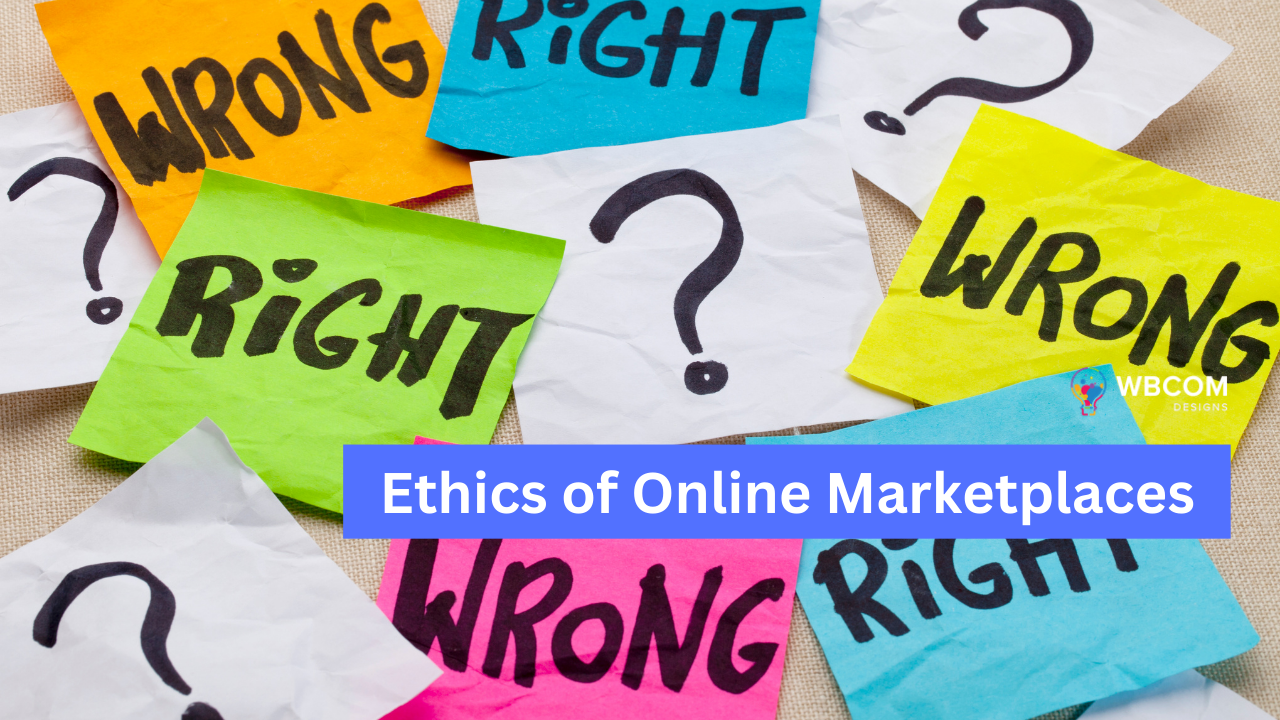In today’s hyper-connected world, online marketplaces have become ubiquitous in our daily lives. From buying groceries to booking a vacation rental, these platforms have revolutionized the way we shop and consume goods and services. However, as online marketplaces continue to expand and grow, there is an ever-increasing need to examine the ethical implications of their operations. Are these platforms truly fulfilling their purpose of serving the greater good, or are they solely focused on maximizing profits at any cost? In this blog post, we will explore the complex and often-overlooked ethical issues surrounding online marketplaces, and delve into the importance of striking a delicate balance between profit and purpose. Join us as we challenge conventional thinking and ask the tough questions about the ethics of online marketplaces.
Table of Contents
ToggleDefining Ethics in Online Marketplaces
Ethics refers to the principles and values that guide behaviors and decision-making in a given situation or environment. For online marketplaces, ethical behavior involves upholding social responsibility and treating all stakeholders fairly, including consumers, employees, suppliers, and the environment. Online marketplaces are expected to act with integrity and transparency, promoting the common good while avoiding harm.
Overview of Industry Standards and Regulations:
As the online marketplace industry continues to grow, industry standards and regulations are increasingly being put in place to ensure that ethical behavior is prioritized. Various organizations, including government bodies and trade associations establish these standards and regulations. They cover a range of issues, including consumer protection, data privacy, fair competition, and environmental sustainability.
One of the most well-known industry standards is the Better Business Bureau (BBB) Accreditation. The BBB is a non-profit organization that accredits businesses that meet its standards of trust. The BBB sets ethical guidelines for online marketplaces, including truth in advertising, transparent business practices, and responsible data handling.
Additionally, regulations such as the General Data Protection Regulation (GDPR) and the California Consumer Privacy Act (CCPA) aim to protect consumers’ privacy rights by requiring companies to be transparent about collecting, using, and sharing personal data. These regulations also give consumers the right to access and delete their personal information.
Furthermore, anti-trust laws and fair competition regulations are in place to prevent online marketplaces from engaging in anti-competitive behavior such as price fixing, market allocation, or monopolistic practices.
Ethical Issues Surrounding Online Marketplaces
- Consumer Privacy: Online marketplaces collect vast amounts of consumer data, including personal information, search history, and purchasing behavior. Ethical concerns arise when these platforms fail to protect users’ privacy or use their data in unethical ways, such as selling it to third-party companies without consent.
- Platform Responsibility for User-generated Content: Online marketplaces rely on user-generated content to build their businesses, such as product reviews, comments, and ratings. However, ethical issues arise when the platform fails to moderate or remove harmful or misleading content, such as fake reviews, hate speech, or discriminatory language.
- Fair Pricing and Anti-Competitive Behavior: Online marketplaces have been criticized for engaging in anti-competitive behavior, such as using their dominant market position to suppress competition or setting unfair pricing policies unfairly. Ethical concerns also arise when online marketplaces use algorithms to manipulate pricing or present misleading pricing information to consumers.
- Worker and Contractor Treatment: Online marketplaces often rely on a network of contractors and gig workers to provide services or deliver products. Ethical concerns arise when these workers are not provided with fair compensation, benefits, or protections, such as health insurance, sick leave, or workers’ compensation.
- Environmental Sustainability: Online marketplaces have a significant environmental impact, including the carbon footprint of shipping and transportation, packaging waste, and the disposal of returned products. Ethical concerns arise when online marketplaces fail to prioritize sustainable practices, such as reducing packaging waste, promoting environmentally friendly shipping options, or incentivizing the reuse of products.
Overall, online marketplaces are responsible for addressing these ethical issues to ensure they operate ethically and socially responsibly. By prioritizing consumer privacy, fair pricing, responsible content moderation, worker treatment, and environmental sustainability, online marketplaces can help to promote the common good and build trust with their users.
Balancing Profit and Purpose
The question of whether online marketplaces can make a profit while still upholding ethical principles is a complex one. While some argue that prioritizing ethical principles may reduce profitability in the short term, others believe that ethical behavior can actually enhance a company’s reputation and build long-term success.
Strategies for balancing profit and purpose include
- Prioritizing Social Responsibility: Online marketplaces can prioritize social responsibility by adopting policies that promote fair treatment of workers and contractors, reduce environmental impact, and prioritize consumer privacy. By prioritizing these values, online marketplaces can build trust with their users and enhance their reputation.
- Investing in Ethical Technology: Online marketplaces can invest in ethical technology, such as algorithms that prioritize fairness and transparency. By using algorithms that are designed to promote fairness and transparency, online marketplaces can ensure that their pricing and search results are not biased towards certain products or sellers.
- Collaborating with Industry Groups: Online marketplaces can collaborate with industry groups to establish ethical standards and promote best practices. By working together, industry groups can help to ensure that ethical behavior is prioritized across the industry.
- Fostering a Culture of Ethical Behavior: Online marketplaces can foster a culture of ethical behavior by promoting ethical values and rewarding employees for upholding these values. By making ethical behavior a core part of the company culture, online marketplaces can ensure that all employees are committed to promoting ethical behavior.
Wrapping Up Words | Ethics of Online Marketplaces
As online marketplaces continue to grow in popularity, it’s important to consider the ethical implications of these platforms. Balancing profit and purpose can be difficult, but it’s crucial for the success and sustainability of these businesses. By prioritizing transparency, fairness, and social responsibility, online marketplaces can positively impact their communities and attract and retain loyal customers. As consumers, we can promote ethical practices by supporting businesses aligning with our values. Let’s work together to create a more ethical and sustainable online marketplace ecosystem.







